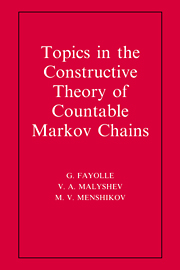1 - Preliminaries
Published online by Cambridge University Press: 05 November 2011
Summary
In sections 1.1, 1.2 and 1.3 of this chapter, we briefly introduce basic notions and some results borrowed from the theory of discrete time homogeneous countable Markov chains (MC).
In section 1.4, some well known examples of MCs are given, for which a complete classification can be obtained by elementary methods: simple probabilistic arguments in 1.4.1, explicit solution of recurrent equations in 1.4.2, generating functions in 1.4.3.
It is not our intention to devote a detailed section to the fundamentals of probability theory, which are presented in a plethora of excellent text-books. Thus, we only introduce in fact the minimal basic notions and notation useful for our purpose.
The events are the subsets of some abstract set Ω, which belong to Σ, the σ-algebra defined on Ω.
The couple (Ω, Σ) is a measurable space and the sets belonging to Σ are
Σ-measurable sets.
The triple (Ω, Σ, µ), where µ, is a positive measure defined on Σ, is a measure space. A probability space is a measure space of total measure 1, i.e. µ(Σ) = 1, and in this case most of the time we shall write (Ω, Σ, P).
A Σ-measurable real-valued function f with domain Ω is called a random variable. More generally a random element ϕ with values in a measurable space (X, B) is a measurable mapping of (Ω, Σ, P) into (X, B). For X = RN or ZN, B being the σ-algebra of Borel sets, we shall speak of random vectors.
- Type
- Chapter
- Information
- Publisher: Cambridge University PressPrint publication year: 1995



